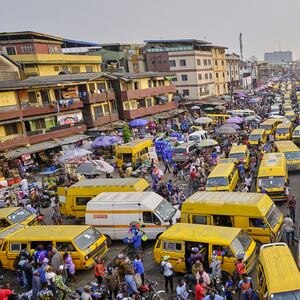India’s catastrophic coronavirus outbreak has now sent lethal reverberations to Africa, where countries are relying on Indian-made vaccines through the COVID-19 Vaccines Global Access program known as COVAX.
The World Economic Forum warned that Africa, which already has the world’s slowest vaccine rollout, with just 2 percent of the entire population inoculated, risked being left vulnerable to a wave of new variants as the virus mutates unchecked across the continent due to vaccine shortfalls caused by India’s crisis.
Globally, 150 doses per 1,000 people have been put into arms. In Africa, just eight doses per 1,000 people have been administered. And with India, the world’s largest vaccine manufacturer, now unable to meet vaccine export demands meant for the COVAX program in Africa, that number could drop even further.
ADVERTISEMENT
Around 140 million doses of vaccines intended to be distributed to low-income countries in Africa through COVAX were missed in May. “Another 50 million doses are likely to be missed in June,” Henrietta Fore, the director of UNICEF, said in a statement. “We are concerned that the deadly spike in India is a precursor to what will happen if those warnings remain unheeded. While the situation in India is tragic, it is not unique.”
Taiwan, too, is in the midst of a devastating second wave after having largely skirted the brunt of the first wave. But variants have taken hold there, and anticipated vaccines through COVAX—again produced in India—have not arrived. Now the country is grappling with how to divvy up 300,000 doses on hand for a population that exceeds 24 million and whether they should save second doses or just get as many people a first dose as possible. Just 1 percent of the population is fully inoculated.
The World Health Organization has also recommended that all African countries use all the doses of whatever vaccines they have to give first jabs to as many people as possible rather than saving supplies for second doses to provide at least partial protection to as many as possible. On Monday, WHO Director Tedros Adhanom Ghebreyesus nudged the Serum Institute of India, which supplies the COVAX program, to “get back on track and catch up” despite being overwhelmed.
The World Economic Forum is now calling on wealthy countries to abandon “vaccine nationalism” and help struggling nations by making vaccines global public goods with intellectual property data open to all. India and South Africa have called for a waiver on Trade-Related Aspects of Intellectual Property Rights (TRIPS) to speed up the production of vaccines. The Biden administration has already called for patent sharing to help produce more vaccines.
“Recent announcements on COVID-19 vaccine exports will undoubtedly blunt the momentum behind efforts to ensure global, equitable access to COVID-19 vaccines,” said Chido Munyati, head of Africa at the World Economic Forum. “This is the time for real public-private partnership as the world is facing one of its biggest challenges.”
China has been among the first to heed the call to help Africa by donating vaccines to more than a dozen African countries to fill the gap created by the COVAX shortfalls. Beijing also supports the TRIPS waiver, which could also aid China in improving its own made-in-China vaccine, which has low efficacy, and of which it has pledged 10 million doses to COVAX.
Chinese Foreign Ministry spokesman Zhao Lijian pledged Monday that they would continue to do more. “As the largest developing country and a responsible member of the international community, China will do all things that are conducive to developing countries’ fight against the virus and support all actions that can help developing countries acquire vaccines in an equitable way,” he said. “We are also working with over 10 developing countries including Egypt and the UAE on technological transfer and cooperative production to quickly advance large-scale production of vaccines.”
But until any of these pledges and promises become reality, Africa is slowly nearing the edge of the COVID-19 cliff. The World Economic Forum says the delays “could have further long-lasting consequences on Sub-Saharan Africa’s economies” since without vaccine protection, the pandemic will continue there unhindered, giving way to the development of new vaccine-resistant variants, stifling already sluggish economies, and taxing health systems that will quickly buckle under any more pressure.






